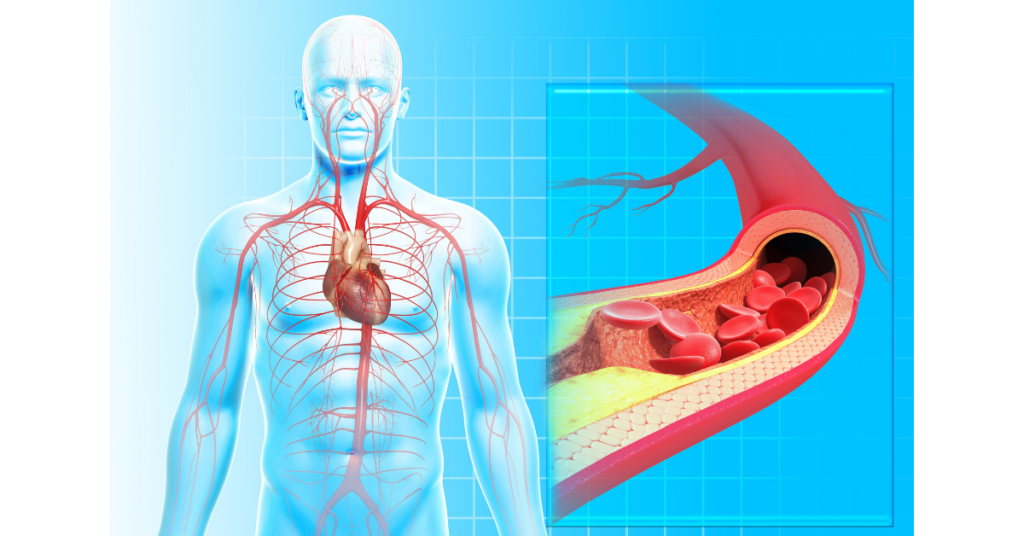What is Arteriosclerosis / Hardening of the Arteries?
This condition is where there is a build-up of deposits on the inside of the artery walls. This in turn causes them to narrow and harden making it increasingly more difficult for the blood to travel round the body. Arteriosclerosis is a vague term that may be used to describe several types of conditions that affect the arteries (the word arteriosclerosis is also often used in place of atherosclerosis). Arteriosclerosis deposits are usually made up of fatty substances although calcium may also be deposited. Hardening of the arteries is a very common disease of the major blood vessels with hardening of the arteries leading to heart attacks if the hardening takes place in the arteries that supply blood to the heart.
One of the reasons blood pressure goes up with this condition is because the heart has to pump the blood round the body with greater force due to counteract the problems caused by the narrowing and hardening. It is also possible to develop hardening and narrowing of the arteries if you have high blood pressure, and for this reason, when blood is forced round the body under high pressure the arteries become weak and strained in certain places. These weakened areas then become a prime site for calcium and fatty deposits to build up, further narrowing the arteries and forcing an already high blood pressure even higher.
Heart attacks occur when the heart is starved of oxygen. One of the ways in which the heart can be deprived of oxygen is if deposits in the coronary arteries build up to such a level that an obstruction occurs. An added danger of deposit build-ups is that a passing blood clot can get stuck on the obstruction, therefore further reducing the flow of oxygenated blood to the heart.
Strokes are when the arteries that carry blood to the brain, as opposed to the heart, become obstructed.
What causes hardening of the arteries?
High cholesterol levels have been linked with the development of hardening of the arteries. Elevated triglycerides are another cause. Smoking is now a well-established cause of atherosclerosis and heart disease. Obesity increases the chances of developing atherosclerosis.
Complementary Approach
Eat high fibre foods, fruit, grains, and vegetables. These should be the main components of your diet.
Do not eat foods that contain trans fatty acids. These are found in margarine, some vegetable oils, and processed foods that contain vegetable oils (1,2). Avoid all foods containing sugar and white flour; avoid eating red meat, junk food, pies, ice cream, butter and lard. Some research suggests egg yolks should be avoided, as they can induce atherosclerosis (3). Sweets, chips, gravies, fried foods, and all high cholesterol foods should be eliminated from the diet.
All stimulants such as tobacco, caffeine, which is found in the following: Chocolate, tea, cocoa, some soft drinks, and some over-the-counter products should be avoided along with alcohol and / or spiced foods.
Do not become overweight; in fact in terms of healthy lifestyle where you should watch both diet and lifestyle, medical research has proved that undertaking a vegan diet (no meat, poultry, dairy products, or eggs) in conjunction with regular exercise and stress management reduces atherosclerosis (4).
The following information does not constitute a prescription or recommended dose – studies have been conducted using the dosages stated and are included for your information only. The nutrients mentioned here are often recommended by healthcare practitioners.
Nutritional Supplements
Vitamin E has been linked to prevention of heart disease (5).
Most healthcare practitioners recommend taking 400-800 IU daily.
Selenium promotes the action of vitamin E, and some studies show that people whose diets include higher levels of selenium have a lower risk of heart disease (6,7). Most healthcare practitioners recommend taking 100-200 mcg daily.
Essential fatty acids go rancid so be sure to buy one that has vitamin E in it as this will help keep it ‘fresh’. EFAs help keep the blood vessels supple, they help reduce blood pressure and they lower cholesterol levels. Take as directed on the label.
Calcium helps with muscle tone in the blood vessels. Take 1,500 mg daily at bedtime, but be sure to use the chelate form.
Vitamin D assists the absorption of calcium. Take 400 mg daily.
Magnesium: Take 750 mg daily at bedtime.
Coenzyme Q10 improves oxygenation in the tissues. Take 100 mg daily.
Multivitamin and mineral complex: Take as directed on label.
Vitamin A is a free radical scavenger and also an antioxidant. Take 25,000 IU daily, unless you are pregnant; in which case, do not exceed 10,000 IU daily. Always use emulsion form.
Natural beta carotene. Take 15,000 IU daily.
Vitamin C with bioflavonoids acts in the same way as vitamin A and works alongside vitamin E. Take 5,000-20,000 mg daily in divided doses and use the buffered form of this vitamin.
Herbs that may help this condition
In studies, guggul was reported to show a significant improvement in the cholesterol and triglyceride levels in some individuals (8). Garlic (9), gingko (10) and guggul (11) have all been shown to have an effect on low-density lipoprotein (LDL) cholesterol, namely in protecting it from damage by free radicals.
Along with the herbs mentioned in the previous section, the herbs mentioned here have historically been considered beneficial in the treatment of various conditions including hardening of the arteries. Therefore, healthcare practitioners often recommend them.
Cayenne, chickweed, and hawthorn berries are helpful in the treatment of arteriosclerosis.
Further Information
Once you have checked with your GP that it is safe for you to do so, you should undertake regular exercise.
If your doctor has recommended you take an aspirin daily (this is often prescribed so that the blood is less likely to clot) you must ensure that you also reduce your intake of foods rich in vitamin K for the aspirin to be effective.
References
1. Nelson GJ. Dietary fat, trans fatty acids, and risk of coronary heart disease. Nutr Rev 1998;250-52.
2. Ascherio A, Willett WC. Health effects of trans fatty acids. Am J Clin Nutr 1997;66(suppl):1006S-10S [review].
3. Raloff J. Oxidized lipids: A key to heart disease? Sci News 1985;127:278.
4. Ornish D, Brown SE, Scherwitz LW, et al. Can lifestyle changes reverse coronary heart disease? Lancet 1990;336:129-33.
5. Stephens NG, Parsons A, Schofield PM, et al. Randomised controlled trial of vitamin E in patients with coronary disease: Cambridge Heart Antioxidant Study (CHAOS). Lancet 1996;347:781-86.
6. Salonen JT, et al. Association between cardiovascular death and myocardial infarction and serum selenium in a matched-pair longitudinal study. Lancet1982;ii:175.
7. Shamberger RJ, Willis CE. Epidemiological studies on selenium and heart disease. Fed Proc 1976;35:578 [abstract #2061].
8. Brown D, Austin S. Hyperlipidemia and Prevention of Coronary Heart Disease. Seattle: Natural Product Research Consultants, 1997, 4-6.
9. Phelps S, Harris WS. Garlic supplementation and lipoprotein oxidation susceptibility. Lipids 1993;28(5):475-77.
10. Yan LJ, Droy-Lefaix MT, Packer L. Ginkgo biloba extract (EGb 761) protects human low density lipoproteins against oxidative modification mediated by copper. Biochem Biophys Res Comm 1995;212:360-66.
11. Singh K, Chander R, Kapoor NK. Guggulsterone, a potent hypolipidaemic, prevents oxidation of low density lipoprotein. Phytother Res 1997;11:291-94.


